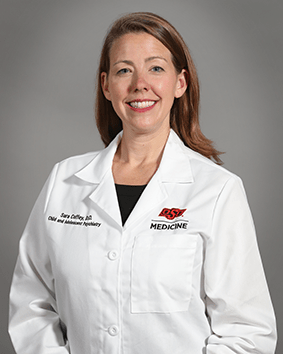
Failing to Focus: ADHD and Children
ADD and ADHD are common diagnoses for children today. What behaviors should parents be aware of? When do symptoms start to occur? Dr. Sara Coffey, board-certified child and adolescent psychiatrist with OSU Medicine, answers some of these questions.
Q: In addition to anxiety, we know ADHD is prevalent in children. Is there a common age where some of that starts to occur?
A: I think it depends on the type of Attention Deficit Hyperactivity Disorder (ADHD). We often think of kids with ADHD as being inattentive and not really paying attention. They might be losing things, forgetting things, or hyperactive and impulsive, with more externalizing behaviors. You may imagine kids running around as if they have a motor talking a mile a minute and always interrupting. And probably not too uncommonly, the hyperactive kids are the ones that get noticed more. It isn’t uncommon that it gets noticed in a school-type setting because it can really impact the youth’s ability to learn and can be disruptive to the classroom. So, school aged kids with ADHD symptoms often come to our clinic, and many have been facing challenges or symptoms of ADHD very early on before we see them.
Q: Is it school personnel that usually raise the issue with the clinician or the parent?
A: That’s often what happens. The teacher might say, “Charlie’s having a lot of difficulties sitting still in class – he’s bothering all the kids and blurting out answers. And I’m really trying to give him some skills or other tools to make sure he doesn’t disrupt.” That’s often when the parents are seeking out support, because their child is not on track like the other kids in the classroom. However, parents might also notice concerns that they bring to the attention of their pediatrician. If caregivers have concerns, I encourage them to reach out to the child’s pediatrician or primary care provider.
Q: For ADD or ADHD, does that diagnosis follow someone throughout adulthood? If so, do you change therapy or medication at some point in adulthood?
A: We often think of ADHD as a neurodevelopmental disorder. Because it is a neurodevelopmental disorder, the criteria for ADHD require that symptoms are present before the age of 12. Roughly a third of children who were diagnosed with ADHD, eventually will not need medications and will grow out of it. The frontal lobe, which is really important for what we call executive functioning, planning, and impulse control, isn’t developed until you’re about 25. The significance of therapy and developing skills as the brain is developing, helps the symptoms not be as persistent.
A third of kids actually have what we call co-morbid diagnoses, meaning more than one condition occurring simultaneously for an extended period. So, they may have a diagnosis of ADHD and anxiety, ADHD and depression, etc., and might need medications to help support all the diagnoses as well.
The remaining third of kids may end up needing lifelong treatment for ADHD because it’s something that stays with them.
If you believe your child could benefit from an appointment with a psychologist or psychiatrist, reach out to OSU Behavioral Medicine. Your pediatrician and/or school counselor are also excellent resources.